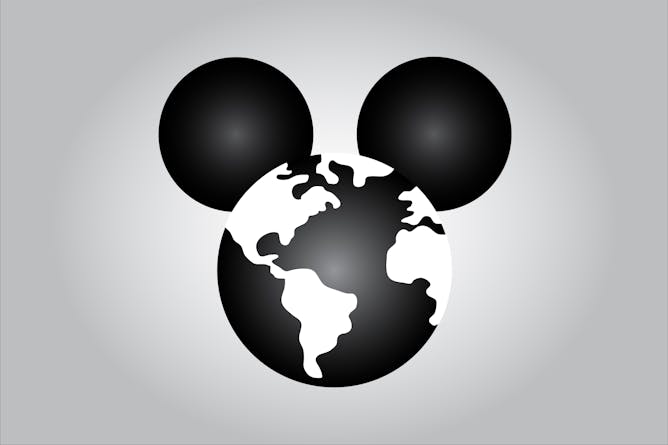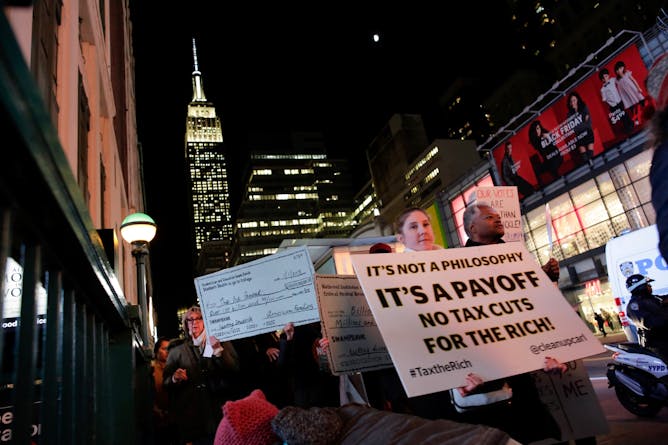Editor's note
|
|
One of the big media stories of 2018 will be the proposed merger of Disney and 21st Century Fox, and American University School of Communication mass media scholar Margot Susca thinks we should be wary. In an era of unprecedented media consolidation, she points out that five media conglomerates essentially control 90 percent of the news and entertainment Americans consume. With this merger, that number will dwindle to four. Because media corporations will always prioritize the bottom line over the public good, she argues, democracy suffers when fewer and fewer
companies act as gatekeepers of information.
There’s no shortage of hot takes right now about how the wildly unpopular GOP tax package, which experts say cuts taxes on the rich and corporations without offering much relief to everyone else, could hand Democrats a big advantage in the 2018 midterm elections. They don’t persuade Stephanie Leiser, a University of Michigan lecturer in public policy. “My students and I have spent this semester reviewing the history of tax reform,” she writes. “It gives us several reasons to be skeptical that voters will punish politicians for the tax
plan.”
And 75 years ago, two giants of English literature were engaged in an ongoing debate over science’s role in society. Author H.G. Wells was all about the promise, while his friend George Orwell was far more skeptical. Indiana University’s Richard Gunderman writes that their argument still resonates today.
|
Nick Lehr
Arts + Culture Editor
|

|
|
Top stories
|

Do we really want one conglomerate to control so much of the media landscape?
Sergsta/Shutterstock.com
Margot Susca, American University School of Communication
Disney's veneer of innocence shouldn't distract people from recognizing the danger of giving one conglomerate the power to control so much information.
|

There are signs that non-rich Americans are growing less tolerant of tax cuts that mainly boost the wealthy’s bottom line.
Reuters//Eduardo Munoz
Stephanie Leiser, University of Michigan
Historically, wishful thinking has blunted pushback.
|

‘Man Combating Ignorance’ – what’s science’s role?
Century of Progress Records, 1927-1952, University of Illinois at Chicago Library
Richard Gunderman, Indiana University
There's no shortage of problems facing humanity. Science's role in how to tackle them has long been debated – including memorably by two of the 20th century's greatest literary figures.
|
Ethics + Religion
|
-
Mathew Schmalz, College of the Holy Cross
The passing of Cardinal Bernard Law is another moment to revisit the issue of sexual abuse within the Catholic Church and why it remains a challenge.
-
Rubén G. Mendoza, California State University, Monterey Bay
At many Spanish missions in the US and Latin America, the rising sun illuminates the altar on the winter solstice or other symbolic days. To the faithful, these events meant that Christ was with them.
|
|
|
|
|
|
|
|
|
|
|
|
Trending on site
|
-
Dan Arbell, American University
Wondering why Jerusalem matters so much? A 25-year veteran of the Israeli Foreign Service explains what you need to know.
-
Steven Pressman, Colorado State University
The American middle class has been on a rocky ride during the 20th century, surging after World War II but falling since the 1980s. The Republican tax plan may be its death knell.
-
Clara Wilkins, Wesleyan University
A majority of white Americans now believe that white people experience racial discrimination, and memes like #ItsOkayToBeWhite are only fanning the flames.
|
|
Today’s chart
|
-

 Roberto Pedace
Scripps College
Roberto Pedace
Scripps College
| |
| |
| |
|
|